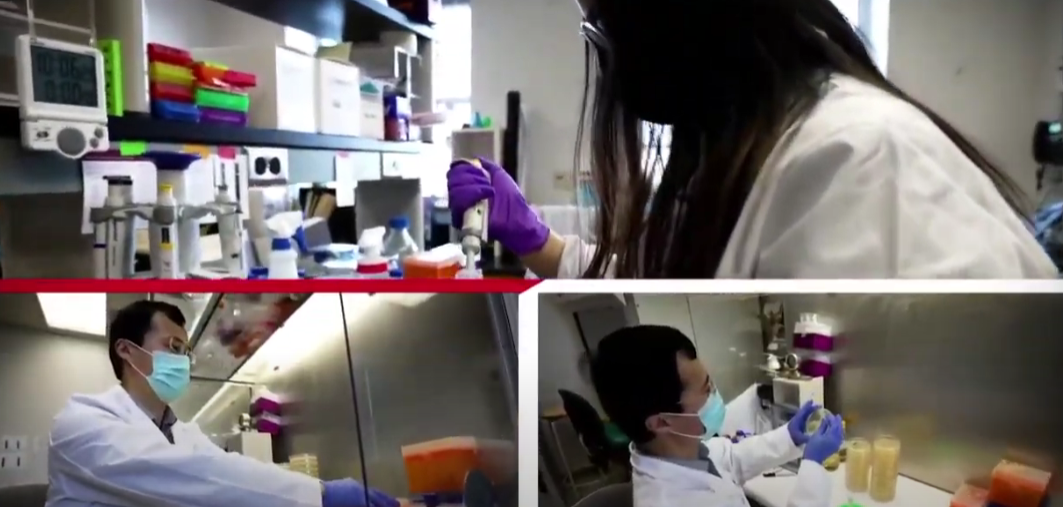Many of the startups launching in this region and others are working to develop tools for the technology that is part of everyday life, from mobile phones to cars to gadgets to drones. A company that was recently launched out of discoveries at the University of Maryland College Park is working on the technology that powers it.
AquaLith Advanced Materials was borne from the university’s battery research strength: It recently licensed a portfolio of lithium-ion battery tech patents from the university that was developed by Dr. Chunsheng Wang, the UMD engineering school’s Robert Franklin and Frances Riggs Wright Distinguished Chair, in collaboration with Kang Xu, a fellow at the Adelphi-based Army Research Laboratory.
Along with Dr. Wang, the company’s founding team includes two technologists with experience growing Maryland companies: Ted Olsen, who led Baltimore-based pathogen detection company PathSensors to its 2020 acquisition by Smiths Detection, and Greg Cooper, the founder of Baltimore-based advanced materials company Pixelligent.
The two met through UMD’s Mtech incubator as they were both starting companies in the early 2000s, with Olsen in the biotech space and Cooper working on nanotech. After Smiths Detection was acquired, they reconnected and decided to put long-term interests in green and renewable energy technology to work.
The technology, which earned invention of the year at the university’s recently announced Innovate Maryland awards, brings an approach that the leaders said will offer more energy storage and lower costs to produce than the lithium-ion technology currently in wide use.
“This is one of the shining stars in renewable energy battery technologies that’s been invented in the last five years,” Olsen, the company’s CEO, said in a video for the awards, summing up the company’s views on the tech’s promise.
The company is working to bring batteries to market that the leaders said could offer a more sustainable approach to powering the eco-conscious devices and vehicles currently showing promise for wide use. Plus, it works in negative-50-degree temperatures. With new battery chemistries that includes a novel aqueous — aka water — electrolyte, it can also offer a safer (read: less flammable) and more environmentally friendly approach.
AquaLith is setting out to bring the new batteries to a lithium ion battery market that was valued around $44 billion in 2020, and is expected to more than double by 2025 as devices and other goods advance. With the technology partnership, it can pursue paths to sell batteries directly to the makers of products, or making the raw materials for battery makers.
Even with market growth, many experts are expecting a shortage in batteries as the new electric vehicles proliferate. If scaled, AquaLith’s technology can offer a new approach at a time when the transition metals used in current batteries, including cobalt, are in short supply and are at the heart of ethics challenges to mining, the leaders said.

The cofounders also see the company as a big job creator in Maryland. For one, they’re looking to draw from the area’s high concentration of scientific talent to drive its R&D. With a technology that will also require physical product to be made when it reaches a scale level, Olsen said it also has the potential to lead to a high volume of manufacturing jobs.
It’s this promise of “tremendous economic opportunity and ability to do good,” as Cooper put it, that has the two entrepreneurs charged up.
“The merits of this particular technology — having looked at it closely and what else is out there — this has a great chance to be the right solution for a huge swath of the world’s needs,” said Cooper, who, with Pixelligent, previously started a company that seized on new chemistry approaches to play a role in the assembly and environmental impact of devices.
The cofounders want to build in Maryland, owing to the transportation infrastructure. In an area that was long a blue-collar bastion, they also see opportunity to hire and develop new talent, as Olsen’s PathSensors did through the years through biotech program partnerships with Baltimore City Community College, the BioTechnical Institute of Maryland and local universities.
The team is currently working out of space in College Park, but the leaders haven’t yet picked a locale within the state for a long-term home. Olsen said they are scouting space from “Riverdale to Baltimore” in search of a home both for the factory operations and company headquarters.
Plenty of startups have big visions that extend worldwide. Still, this is a particularly big play, given the market size and manufacturing needs. It won’t be done alone. As they get up and running on a big effort, the cofounders see a role for the wider civic and business community in Maryland to get involved. At the same time, they want to make local impact alongside global growth, and they are talking about that from the start.
“The more support we have, the faster we can move,” Olsen said. “The faster we move, the more we’re able to impact what you hear about in the news, which is that there’s not enough battery capacity in this country.”







